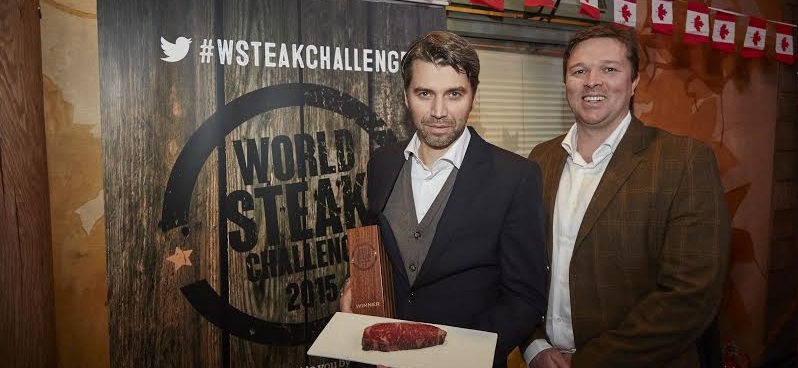Australia tops global World Steak Challenge

Albers GMBH was today announced the world’s best steak producer with a Wagyu cross reared in Australia.
The winning steak was from an animal bred on Willow Tree Farm by Jack’s Creek and was entered into the competition by Albers GMBH from Dusseldorf, Germany.
The global challenge, which recognises Gold and Silver Medal steak quality, is presented by Global Meat News. The winners were announced before an audience of 150 invited guests in London’s Hyde Park on October 15th after a day of intensive judging.
Entries in the first ever World Steak Challenge were received from 10 countries, seven of them securing Gold medals. They are Australia (four gold medals), Canada (one), England (two), Japan (one), Northern Ireland (one), Scotland (one), USA (one).
The expert international judging panel shortlisted 11 gold medal award winning steaks from a long list of 70. There are also 17 silver medal winners.
Announcing the overall winner, Global Meat News Editor Rod Addy said: “Whilst the standard of steak was by no means tough, the judging process definitely was. It was a very difficult decision, but our congratulations go to Albers for the Wagyu cross."
Frank Albers, owner of Albers Gmbh said: “It has been quite a journey and is the culmination of 15 years seeking steak perfection. The steak we entered was quite unique. Our Wagyu contains just the right amount of marbling and is very heat resistant which helps when cooking.”
The winning steak was 30 months old and 450 days grain fed.
Chair of the judges, award-winning Northern Ireland butcher George McCartney said: “It was a very difficult decision, but this competition is very good for the steak industry and the beef industry in general. We saw quite a lot of Angus amongst the Gold winners.”
The 11 gold medal winning steaks are:
Australia
World’s Best Steak – Jack’s Creek Wagyu Angus cross, 450 days grain fed, entered by Albers GMBH.
Branded Beef, Brisbane – 24 months old Wagyu Cross. Raised on grass, finished on grain.
Whyalla Farm, Queensland – 22 months Black Angus, 200 day grain fed. Entered by Jan Zandbergen b.v (Netherlands).
Rangers Valley Cattle Station – 27 months Angus grain fed raised in Inverell, New South Wales
Canada
One Earth Farms Corp - 16 months Angus. Range raised, grain finished with barley and Barley silage
England
Flat Iron Farm, Thirsk, Yorkshire – 46 months Pure Bred Dexter, raised for three summers on grass then barley, sugar wheat silage. Entered by Flat Iron, Soho.
Gamage Hall, Gloucestershire – 18 to 20 months Aberdeen Angus Cross, raised on grass haylage, rye grass/white clover mix pasture, grassed on perennial rye grass/red clover/Lucerne silage (alfalfa). Entered by Miller and Carter (Mitchells and Butlers plc).
Japan
Kato Farm - 28 months Japanese Black Wagyu. Grass/grain fed. Entered by Nice to Meat.
Northern Ireland
Mr H Millar – 29 months shorthorn, raised on grass, Entered by Hannan Meats.
Scotland
J Thompson – 18 months Aberdeen Angus raised on straw,oats, pot ale syrup and maise mill. Entered by Scotbeef Ltd.
USA
Eleven Mill Iron Ranch, Sumner, Nebraska – 20 months Black Angus. Milk raised until eight months, pasture grazed nine months (alfalfa, wild grasses) and grain finished (corn, distillers grains, silage, alfalfa).
The World Steak Challenge is presented by Global Meat News, part of William Reed Business Media, the company behind the acclaimed World’s 50 Best Restaurants awards and The International Wine Challenge.
The Entry Breeds
Black Angus, Wagyu, Limousin, Charolais, Red Ruby Devon, Hereford, Dutch Holstein, Welsh Black, Pure Bred Dexter, Meuse-Rhine-Issel, Simmental, Shorthorn, Longhorn, Highland Wagyu.
The Judges
Distinguished award-winning Northern Ireland butcher George McCartney chaired an international panel of meat scientists, master butchers, grillers and chefs who convened Hyde Park, London.
The technical judges were master griller Fernando Larroude of the Gaucho Group; meat scientist Dr Phil Hadley; celebrated Parisian butcher Yves-Marie Le Bourdonnec; South African master butcher Alan Franck; Meat & Livestock Australia (MLA) business development executive Josh Anderson; chef and food writer Kevin Ashton; and the executive chef of the renowned M restaurant Mike Reid.
Joining them for the second round were the Telegraph’s food writer, author and cook Xanthe Clay; BBC Easy Cook magazine editor Keith Kendrick; director of documentary Steak (R) Evolution Franck Ribière; Brett Duarte, Group Executive Chef for Gaucho Restaurants; and blogger Jamie Labate.
Every steak was judged on its own merits against internationally agreed criteria. Technical testing covered two areas: raw and cooked.
After raw analysis, steaks were cooked to a level of medium and probed to a core temperature between 50-55 degrees celsius before being allowed to rest and then sampled. All steaks that achieved the highest Gold medal scores in the technical judging progressed to the second stage of judging.
Gold medal steaks were cooked on lava by Steak Stones chefs for an agreed time and specification based on a home cooking environment and scored by a new panel of judges drawn from a wide range of nationalities and expertise to ensure diverse international tastes are accounted for.
The scores awarded at this stage for each steak were added to the total from stage one to reach an overall score. At this point, the sirloin/striploin with the highest total score was awarded the title World’s Best Steak and its producer World’s Best Steak Producer.
The judging was independent and monitored at every stage. All steaks were coded throughout the judging process so that the producer’s name and country of origin was not revealed until both stages were complete. In this challenge, there was no minimum or maximum maturation date for products entered.








